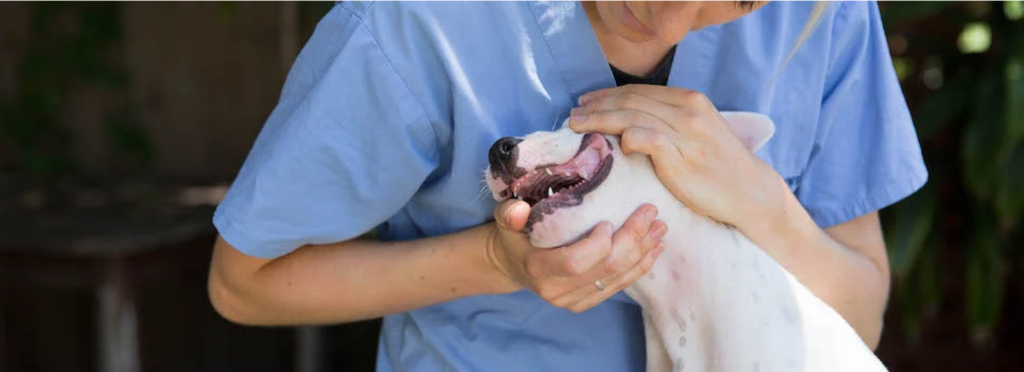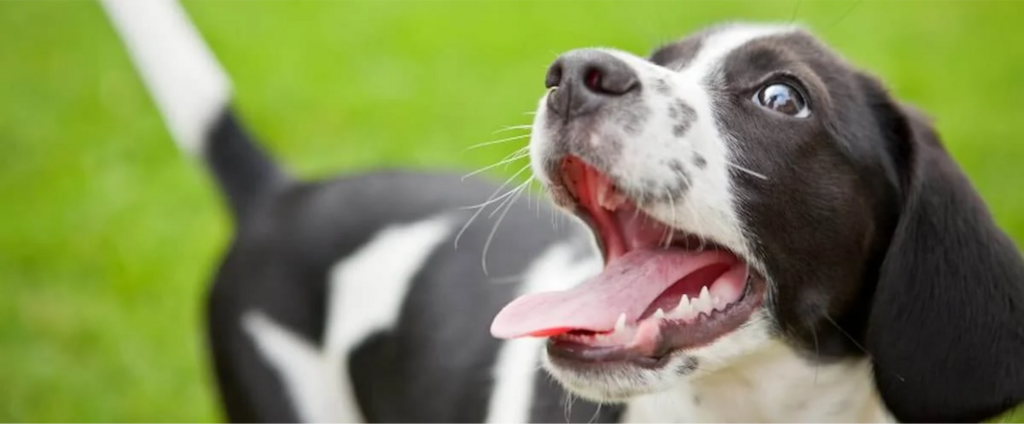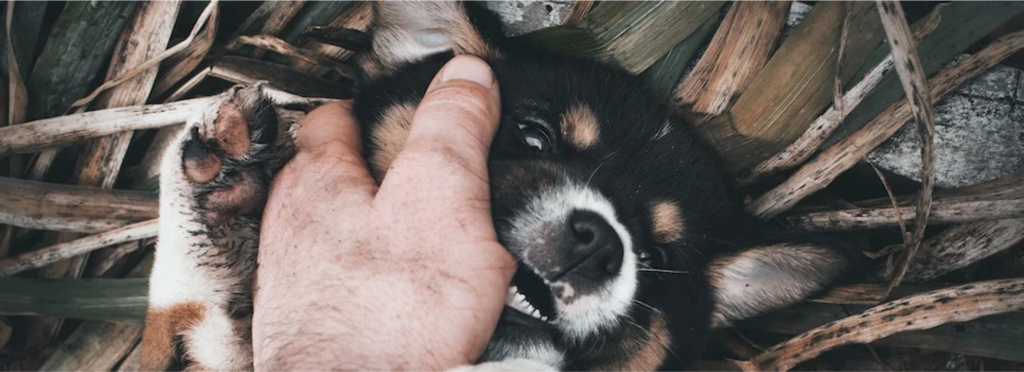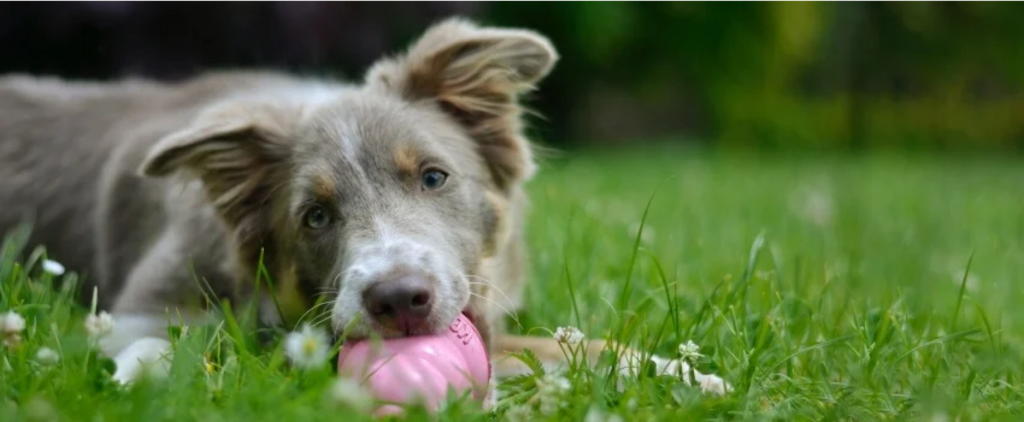Last Updated: 29/03/2025
How to Stop Your Puppy from Biting
Learn why puppies bite and nip and and why and how to address puppy biting early.
Author: Dr Nicole du Plessis BVSc (Hons)
Reading Time: 22 minutes - medium read
New puppy owners often experience the frustration of playful nipping. While these little bites may seem harmless, they can quickly escalate, leading to unwanted behavior. With the right approach, however, you can gently discourage nipping and cultivate a well-behaved companion.
Why do puppies bite?

Understanding why puppies bite is crucial part of pet ownership to ensure the well-being of the puppy, owners, friends and family. Puppies bite for several reasons and knowing these reasons can help you address the issue appropriately.
- Teething: Just like human babies, puppies go through a teething phase. Biting and chewing help alleviate the discomfort they feel as their baby teeth fall out and adult teeth come in. Providing appropriate chew toys can redirect this behaviour. Puppies can have dental issues too, so it is important to have your pup's teeth checked regularly so any issues can be addressed early.
- Play and exploration: Puppies use their mouths to explore the world and interact with their environment. Biting is a natural part of play for them and they often play-bite with their littermates. When puppies interact with humans, they may extend this behaviour to people.
- Socialisation: Puppies learn bite inhibition through socialisation with their littermates and mother. If they bite too hard during play, their littermates will yelp and stop playing. This teaches them to control the force of their bites. When puppies are separated from their litter too early (less than 8 weeks of age), they may not have learned proper bite inhibition.
- Communication: Dogs use their mouths to communicate and this can include gentle mouthing during interactions. It's how they express themselves and convey emotions, like "I want attention."
- Frustration: Biting can be a result of fear or frustration. This can lead to behavioural issues down the track and may require further behavioural training and intervention.
Remember that most puppies grow out of their biting phase as they mature, but it's essential to address the behaviour early to prevent it from becoming a habit. Patience, consistency, and positive reinforcement are key to helping your puppy learn appropriate behaviour and become a safe and well-adjusted adult dog. If you're having trouble managing your puppy's biting behaviour, consider seeking help from a professional dog trainer or behaviourist. They can provide guidance and techniques to address the issue effectively.
The importance of addressing biting early

Addressing puppy biting early is crucial, as it can have a significant impact on the human-animal bond. Yes, puppy play can be cute and adorable, for a little while. Most puppies have their adult teeth by 6 months of age. These teeth can do serious damage if your puppy does not understand that teeth should not be on human skin, ever! This is where 'bite inhibition' becomes so important.
- Bite Inhibition: Puppies learn bite inhibition through interactions with their littermates. If they are removed from their litter too early or if biting is not addressed, they may not learn to control the force of their bites. This can lead to unintentional injuries when interacting with people or other animals.
- Safety: Puppies have sharp teeth and their bites can be painful and lead to infection. If left unaddressed, a puppy's biting behaviour can escalate, leading to injuries, especially in households with children, elderly individuals, or other pets. Addressing this behaviour early helps prevent accidents.
- Preventing Bad Habits: If a puppy is allowed to continue biting without appropriate guidance, it can develop a habit of using its mouth to interact with people. This habit can be challenging to break in older dogs and may lead to behaviour issues in the future. It will also make examination challenging and more expensive during veterinary visits.
- Socialization: Early puppyhood is a critical time for socialisation. Teaching a puppy how to interact with other dogs and humans appropriately is essential for their long-term well-being. Biting can hinder their ability to form positive social connections with people and other animals.
- Positive Human-Animal Bond: By teaching a puppy appropriate behaviours and boundaries, you help strengthen the bond between you and your pet. A well-trained and well-behaved dog is more likely to be a beloved member of the family and less likely to be a source of frustration.
How to teach puppies not to bite and nip

No hard biting (Bite inhibition)
Bite inhibition refers to a dog's understanding the pressure of their mouth during interactions. If a puppy or dog hasn't acquired bite inhibition, they may not understand the sensitivity of human skin, resulting in excessively hard biting, even during play. Some experts and trainers believe that dogs trained to use their mouths gently when interacting with people are less likely to inflict severe bites, especially when they are fearful or in pain.
Puppies typically develop bite inhibition through play with other puppies. When observing a group of puppies at play, you'll see lots of chasing, pouncing, and wrestling. Puppies often nip and bite each other, occasionally biting too hard. When this happens, the injured pup lets out a yelp and usually ceases play. The aggressor, startled by the yelp, also pauses momentarily. Soon after, they both resume playing as normal. Through these interactions, puppies learn to moderate the intensity of their bites to avoid causing harm, allowing play to continue uninterrupted. The lesson puppies learn from each other can also be extended to interactions with people.
When you play with your puppy, allow them to mouth on your hands. Continue play until they bite particularly hard. At this point, emit a high-pitched yelp, simulating pain, and let your hand go limp. This should startle your puppy and cause them to stop play, if only temporarily. (If yelping seems ineffective, you can use a firm voice to say "No more!") Praise your puppy for stopping or for licking you, and then resume your activities. If your puppy bites hard again, repeat the process during a short play session. If yelping alone proves ineffective, you can transition to a time-out approach.
When your puppy delivers a hard bite, yelp loudly. Then, as your puppy startles and looks at you or around, withdraw your hand. Either ignore your puppy for 10 to 20 seconds or, if they continue to mouth you, move away for the same duration. After the brief time-out, return to your puppy and encourage them to play with you again. The key is to convey that gentle play is encouraged, but painful play results in a pause. Continue this process for moderately hard bites, and gradually work your way to extremely gentle play. Your puppy should learn to control the force of their mouthing, with the goal to have no teeth on skin at all.
The 'no teeth on skin' rule
Redirect with Toys
First and foremost, when your puppy attempts to chew on your fingers or toes, offer a substitute like a toy or puppy-safe chew. This can really help satisfy their teething instincts. Encourage alternative forms of play, such as fetch and tug-of-war, instead of engaging in wrestling or rough play using your hands. If your puppy can play tug safely, keep tug toys within reach. When your puppy starts mouthing, swiftly redirect their attention to the tug toy, with the hope that they'll learn to seek out a toy when they feel like mouthing.
Puppies need a lot of mental stimulation too, so providing plenty of puzzle toys can really help tire them out.
The Modified "Time-Out" Technique
Incorporate a modified time-out procedure. Instead of using time-outs for hard or moderate force biting, apply them whenever you feel your puppy's teeth on your skin. When your puppy's teeth touch you, emit a high-pitched yelp and promptly walk away from them. Ignore your puppy for 30 to 60 seconds. If they persist in following you or biting, leave the room for the same duration (ensuring that the area is puppy-proofed). Return after the brief time-out and continue your activities calmly.
If time-outs aren't feasible or effective, consider using a taste deterrent. Apply it to areas on your body or clothing that your puppy tends to mouth. If they bite, cease moving and wait for them to react to the unpleasant taste. Lavish praise when they let go. Apply the deterrent for at least two weeks and your puppy should learn to inhibit their mouthy behaviour after experiencing the bitter taste.
Discourage herding instincts
In the case of your puppy biting at your feet and ankles, have their favourite tug toy handy. Stop moving your feet as soon as they pounce, take out the toy, and entice them with it. Once your puppy grabs the toy, you can resume moving. Provide a variety of captivating and new toys for your puppy to play with, diverting their attention away from gnawing on you or your clothing.
If the puppy tries to herd by nipping, stand-still to discourage the behaviour. If you don't have the toy nearby, freeze and wait for your puppy to cease mouthing. When they stop, offer praise and a toy as a reward. Continue these steps until your puppy gets accustomed to your movements without targeting your feet or ankles.
Socialisation
Ensure your puppy has ample opportunities to interact with other puppies and friendly, vaccinated adult dogs. Playing with dog companions is vital for your puppy's development, and if they expend a lot of energy playing with other dogs, they'll be less inclined to play roughly with you. Enrolling your puppy in a reputable puppy class can be a great way to facilitate supervised playtime with other puppies and pick up essential skills.
Training commands
Solidifying basic obedience can be a big help for many aspects of dog ownership. Train your puppy with basic commands that instruct them to let go or stay away from something. To learn how to do this, see our article How to teach your dog to "leave it."
If the "leave it" command is a little too complicated for your puppy, you can distract your puppy with a "sit" and "stay" command. To learn how to teach your puppy these commands, see our article How to teach your dog to "sit" and How to teach your dog to "stay.
Positive reinforcement
Puppies commonly mouth on people's hands when they're being petted or interacted with, except when they're sleepy or distracted. To manage this, try distracting your puppy by feeding them puppy treats from your other hand. This helps them get accustomed to being touched without mouthing.
Another fantastic and possibly underutilised method is clicker training, which involves using a clicker to reinforce good behaviour. To read more on this, you can read our article How to clicker train your dog.
Additional tips and considerations

Never punish your puppy
Punishment is a term used to describe a method which will reduce the likelihood of the undesired behaviour being repeated in the future. In the context of training, these are methods which can induce fear, pain, or discomfort in an animal as a consequence of engaging in unwanted behaviour. Although yelling can make us feel better in the moment, it can hinder the training process. We do not recommend this direction as it can lead to further maladaptive behaviours.
Negative reinforcement is another method of training we do not recommend. It involves an animal becoming more inclined to perform a behaviour in the future as a means of avoiding or alleviating something unpleasant. This is why the use of bitterant sprays would be a last resort measure when it comes to puppy biting.
Mouthing puppies can be difficult
This can be a very challenging problem to tackle on your own and can be damaging to the human-animal bond. If you suspect that your puppy's biting is aggressive or fearful behaviour, it is strongly recommended to consult with a qualified professional that focuses on fear-free, positive reinforcement methods. Consider reaching out to a registered specialist in veterinary behavioural medicine. To find or trainer or specialist in your area, you can visit the delta institute or you can speak to your veterinarian for assistance.

Further Reading
Want to read more? Check out our other articles:
History
Our experts continually monitor the health and wellness space and we update our articles when new information becomes available.
Sun Mar 23 2025
Edited by Dr Teagan Lever BVSc (Hons)Dr Nicole du Plessis BVSc (Hons)
Author, BVSc (Hons)
Dr. Nicole du Plessis is one of Pet Circle's qualified veterinarians and passionate pet care enthusiasts. Dr. Nicole graduated from the University of Queensland in 2016 with a Bachelor of Veterinary Science and worked for a number of years in small animal clinics across South East Queensland before joining the Pet Circle team. Over the years, Nicole has developed special interests in preventative medicine, infectious diseases, small animal medicine and ultrasound.

